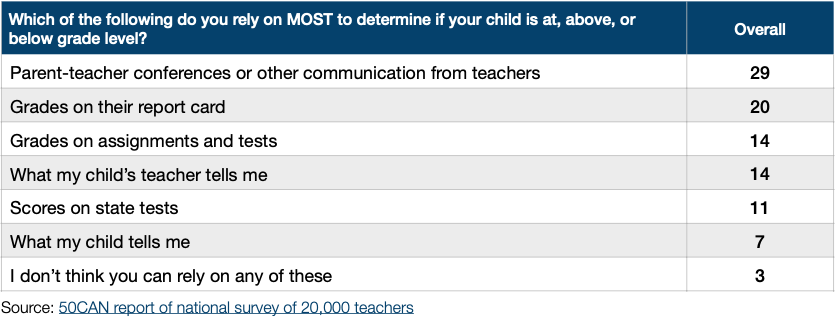Recently, 50CAN released the results of a national survey of 20,000 parents. The key takeaway: parents said they relied more on communications from their child’s classroom teachers than they did on grades to understand how their children were doing in school. Until now, surveys of parents had indicated that they primarily relied on classroom grades, often leading to a skewed understanding of whether their child was truly on grade level. Bibb Hubbard, President of Learning Heroes commented, “For the first time, grades are not the number one factor. … Teachers really are on the front lines in terms of communicating to families about where their kids are.”
Overall, 29% said they relied most on parent-teacher conferences or other communication from teachers to determine if their child was a grade level, compared to 20% who said they relied most on grades on their report card and 14% who said they relied most on grades on assignments and tests.

One reason for the change, according to Hubbard, is the “falling importance of grades as a dependable measure of learning.” In other words, grade inflation. Even before COVID, there was a mismatch between student classroom grades and test scores, as we have highlighted in past editions of the Emerging Issues newsletter. In the wake of the pandemic, some states and districts changed or relaxed grading standards. Data from our own surveys supports the assertion that grades may no longer be as important as they once were in evaluating student learning. In the February survey for Winning the Issues earlier this year, a 55% majority did not believe that grades are the best indicator of a student’s knowledge and skill level (36-55 believe-do not believe). Among parents, 57% did not believe it (36-57).
It is important to note however, that according to the 50CAN survey, more parents rely on classroom grades than they do standardized test scores. Only 11% said they relied most on scores on state tests, compared to 20% relying most report card grades and 14% relying most grades on assignments and tests. This is also supported by our own data from Winning the Issues. From the April survey this year, voters overall said classroom grades were a better indicator of a high school student’s knowledge and skill by a margin of +11 (48-37 grades-test scores). Among parents, the margin was +21 (56-35).
Parents may be starting to recognize the limitations of relying on classroom grades alone, but they have not started to rely on test scores at the same scale.







